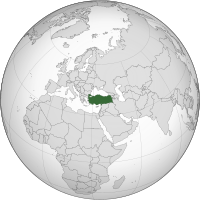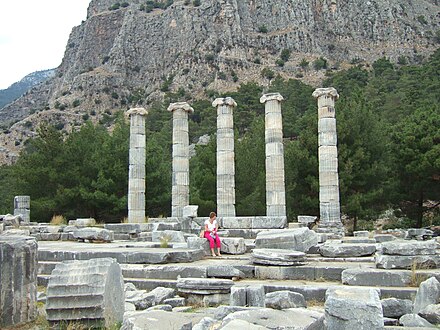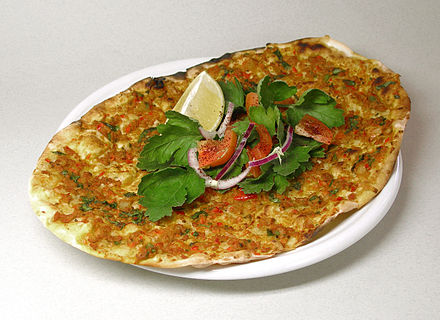Portal:Turkey
Merhaba! Türkiye portalına hoşgeldiniz. Hi! Welcome to the Turkey portal.
 | |

| |
Turkey, officially the Republic of Türkiye, is a country mainly in Anatolia in West Asia, with a smaller part called East Thrace in Southeast Europe. It borders the Black Sea to the north; Georgia, Armenia, Azerbaijan, and Iran to the east; Iraq, Syria, and the Mediterranean Sea (and Cyprus) to the south; and the Aegean Sea, Greece, and Bulgaria to the west. Turkey is home to over 85 million people; most are ethnic Turks, while ethnic Kurds are the largest ethnic minority. Officially a secular state, Turkey has a Muslim-majority population. Ankara is Turkey's capital and second-largest city; Istanbul is its largest city, and its economic and financial center, as well as the largest city in Europe. Other major cities include İzmir, Bursa and Antalya.
Human habitation began in the Late Paleolithic. Home to important Neolithic sites like Göbekli Tepe and some of the earliest farming areas, present-day Turkey was inhabited by various ancient peoples. Hattians were assimilated by the incoming Anatolian peoples. Increasing diversity during Classical Anatolia transitioned into cultural Hellenization following the conquests of Alexander the Great; Hellenization continued during the Roman and Byzantine eras. The Seljuk Turks began migrating into Anatolia in the 11th century, starting the Turkification process. The Seljuk Sultanate of Rum ruled Anatolia until the Mongol invasion in 1243, when it disintegrated into Turkish principalities. Beginning in 1299, the Ottomans united the principalities and expanded; Mehmed II conquered Istanbul in 1453. During the reigns of Selim I and Suleiman the Magnificent, the Ottoman Empire became a global power. From 1789 onwards, the empire saw major transformation, reforms, and centralization while its territory declined.
In the 19th and early 20th centuries, persecution of Muslims during the Ottoman contraction and in the Russian Empire resulted in large-scale loss of life and mass migration into modern-day Turkey from the Balkans, Caucasus, and Crimea. Under the control of the Three Pashas, the Ottoman Empire entered World War I in 1914, during which the Ottoman government committed genocides against its Armenian, Greek and Assyrian subjects. After its defeat, the Ottoman Empire was partitioned. The Turkish War of Independence resulted in the abolition of the sultanate in 1922 and the signing of the Treaty of Lausanne in 1923. The Republic was proclaimed on 29 October 1923, modelled on the reforms initiated by the country's first president, Mustafa Kemal Atatürk. Turkey remained neutral during most of World War II, but was involved in the Korean War. Coups in 1960 and 1980 interrupted the transition to a multi-party system.
Turkey is an upper-middle-income and emerging country; its economy is the 18th- or 11th-largest in the world. It is a unitary presidential republic. Turkey is a founding member of the OECD, G20, and Organization of Turkic States. With a geopolitically significant location, Turkey is a regional power and an early member of NATO. An EU-candidate, Turkey is part of the EU Customs Union, CoE, OIC, and TURKSOY. Turkey has coastal plains, a high central plateau, and various mountain ranges; its climate is temperate with harsher conditions in the interior. Home to three biodiversity hotspots, Turkey is prone to frequent earthquakes and is highly vulnerable to climate change. Turkey has universal healthcare, growing access to education, and increasing innovativeness. It is a leading TV content exporter. With 21 UNESCO World Heritage sites, 30 UNESCO intangible cultural heritage inscriptions, and a rich and diverse cuisine, Turkey is the fourth most visited country in the world. (Full article...)
Selected article -
_LOC_matpc.16728_(cropped).jpg/440px-Turkey._Ankara._Palace_of_Attaturk_(i.e.,_Ataturk)_LOC_matpc.16728_(cropped).jpg)
The confiscation of Armenian properties by the Ottoman and Turkish governments involved seizure of the assets, properties and land of the country's Armenian community. Starting with the Hamidian massacres and peaking during the Armenian genocide, the confiscation of the Armenian property lasted continuously until 1974. Much of the confiscations during the Armenian genocide were made after the Armenians were deported into the Syrian Desert with the government declaring their goods and assets left behind as "abandoned". Virtually all properties owned by Armenians living in their ancestral homeland in Western Armenia were confiscated and later distributed among the local Muslim population.
Historians argue that the mass confiscation of Armenian properties was an important factor in forming the economic basis of the Turkish Republic while endowing the Turkish economy with capital. The appropriation led to the formation of a new Turkish bourgeoisie and middle class. (Full article...)General images
Did you know -
- ... that the Turkish military coup of 1971 is known as a coup by memorandum? (August 10, 2004) Wikipedia:Recent additions 13
- ... that the 1993 Bayburt Üzengili avalanche in north-eastern Turkey killed 59 people and 650 livestock, and caused the relocation of the village to a safe zone? (October 20, 2010)
- ... that one of the accused assassins of Turkish former government minister Gün Sazak later hijacked an airplane to Bulgaria with accomplices? (February 21, 2014)
- ... that Morocco–Turkey relations started as early as the 16th century, with the expansion of the Ottoman Empire into Northern Africa? (October 26, 2010)
- ... that Muhtar Kent, named to assume the post of CEO of the Coca-Cola Company on July 1, 2008, is the son of a Turkish diplomat, who risked his life to save Jews in France during the Holocaust? (December 15, 2007) Wikipedia:Recent additions 191
- ... that the McGhee Center for Eastern Mediterranean Studies in Alanya is run by Georgetown University as the only independent study program in Turkey? (November 12, 2007) Wikipedia:Recent additions 185
- ... that due to a campaign in Turkey, speaking a language other than Turkish was illegal in many parts of the country? (January 15, 2013)
Selected picture
Selected biography -
Tarkan Tevetoğlu (Turkish pronunciation: [taɾˈkan teveˈtoːɫu]; born 17 October 1972) is a Turkish singer-songwriter. Since the early 1990s, with the successful sales of his albums, he has been a prominent figure of pop music, recognized in Turkey and worldwide.
Tarkan was born and raised in Alzey, Rhineland-Palatinate. In 1986, he moved to Turkey together with his family. Tarkan, who had been interested in music since his childhood, went to high school at Karamürsel and took music lessons. In the following years, he met the owner of İstanbul Plak, Mehmet Söğütoğlu, and signed a contract to release his own album. (Full article...)Selected video -
Selected quote -
| “ | Everything we see in the world is the creative work of women. | ” |
Turkish proverbs in Wikiquote
Recognized content
Provinces
Related portals
Religions in Turkey
Neighbouring countries
Countries with related heritage
WikiProjects
Turkish wikipedia
 |
There is a Turkish version of Wikipedia, the free encyclopedia. |
Wikimedia
The following Wikimedia Foundation sister projects provide more on this subject:
-
Commons
Free media repository -
Wikibooks
Free textbooks and manuals -
Wikidata
Free knowledge base -
Wikinews
Free-content news -
Wikiquote
Collection of quotations -
Wikisource
Free-content library -
Wikiversity
Free learning tools -
Wikivoyage
Free travel guide -
Wiktionary
Dictionary and thesaurus
- Purge server cache


.jpg/440px-Anit_Kabir_(6526103103).jpg)




.jpg/440px-Sultan_Ahmet_III_Fountain_(48985208178).jpg)






.jpg/440px-The_Bath-Gymnasium_complex_at_Sardis,_late_2nd_-_early_3rd_century_AD,_Sardis,_Turkey_(17098680002).jpg)













.jpg/440px-Kelebekler_Vadisi_(1).jpg)













.jpg/440px-Turkey-3019_-_Hagia_Sophia_(2216460729).jpg)
































.jpg/440px-Fairy_Valley_(Cappadocia).jpg)









.jpg/440px-Tarkan_(9).jpg)














